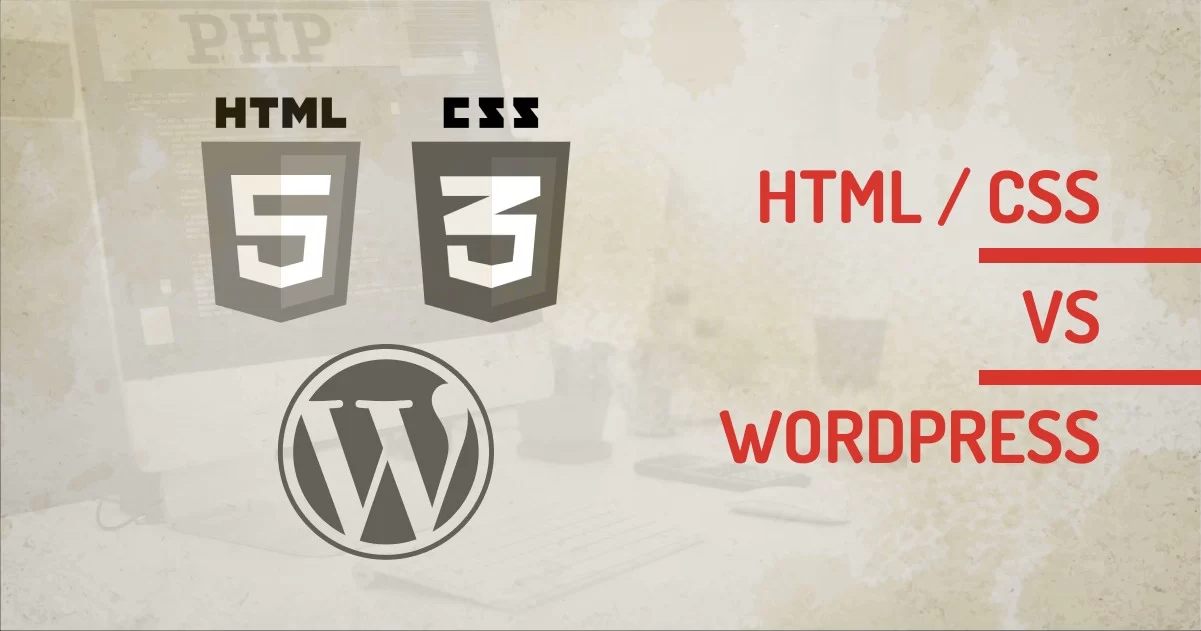
If you ever get across a situation where you need to set up a website and you don't understand all the tech jargon? Your developer offers you a CMS website or an HTML website, what would you choose? There is a simple answer to this question. It just depends on the nature and the purpose of your website. WordPress is a widely used system to build a website if you don't know the coding. Let check out what are the similarities and differences between them both.
Common:
Both WordPress and HTML are used to create a website.
Difference:
HTML is a static version of your site, and WordPress is a system to maintain the content on the site.
Differences Between WordPress and HTML
 WordPress is a content management system (CMS). It enables you to create a website or blog from scratch or to improve an existing website. WordPress is free and open source software released under the GPL. While WordPress is primarily used as a blogging platform, it can be used for any kind of website.
WordPress is a content management system (CMS). It enables you to create a website or blog from scratch or to improve an existing website. WordPress is free and open source software released under the GPL. While WordPress is primarily used as a blogging platform, it can be used for any kind of website.
Interesting right?
WordPress started as a simple blogging system but has evolved into a more powerful CMS. It is used by millions of people around the world, including many large organizations, such as Sony Music, Tech Crunch, and Sportify News. They all used to use WordPress in some form of the backend to store data with lots of customization.
HTML is the backbone of any website. It is a markup language that tells the web browser how to display the text and images on a page. HTML pages are static, which means they don't change until you edit them yourself.
A static website is one that doesn't change - You can think of it as a document for a web browser. You create a document and upload it on the webserver to share it with the world but if you want to edit, you download the document, edit it, save it, upload it again and the world can see the updated version of that document it again. HTML documents are just a collection of pages that are displayed when someone visits the site. This makes them a good choice for simple websites or for pages that are used as templates.
What is a Content Management System
 A content management system (CMS) is a software application that enables the creation and management of digital content. A CMS can be used to create and manage digital content on a website, blog, or intranet.
A content management system (CMS) is a software application that enables the creation and management of digital content. A CMS can be used to create and manage digital content on a website, blog, or intranet.
Content management systems are used to manage all kinds of digital content, including text, images, audio, and video. A CMS can be used to create and manage websites, blogs, and intranets.
A CMS typically includes a WYSIWYG (What You See Is What You Get) editor that enables users to create content without knowing how to code.
A CMS also includes tools for managing users and permissions, organizing content, tracking analytics, and publishing content.
Most CMSs are web-based applications that allow users to access and edit content from any computer with an internet connection. Some CMSs also include features that allow users to publish content directly to their website or blog frontend. CMSs are popular among businesses and organizations of all sizes because they make it easy for employees to create and manage website content.
Additionally, many CMSs are open source software which means they are free to use.
Pros and Cons of WordPress
Pros
 One of the main advantages of WordPress is its flexibility. WordPress can be used for a wide range of websites, from simple blogs to complex e-commerce stores.
One of the main advantages of WordPress is its flexibility. WordPress can be used for a wide range of websites, from simple blogs to complex e-commerce stores.
WordPress also offers a wide range of features, including a customizable dashboard, user roles and permissions, multilingual support, and more.
Another advantage of WordPress is its ease of use. With just a few clicks, you can install WordPress on your website and start publishing content. WordPress also offers a wide range of templates and themes that you can use to customize your website’s look and feel.
WordPress is scalable. WordPress can handle large amounts of traffic without crashing. If your website becomes popular, you can easily upgrade your hosting plan without having to change hosts.
Cons
 There are a few disadvantages to using WordPress.
There are a few disadvantages to using WordPress.
First, it can be difficult to customize if you want to have some specific functionality. General purpose plugins are already made on the WordPress repository but sometimes people need customization to fine-tune the website or app.
On top of that, WordPress is not always the most secure CMS since it's widely used across the world, Wrong kind of hosting can lead to site compromisation.
Furthermore, it can be slow and bloated if not properly optimized. You can literally install 100 plugins and make it slow. Finally, using WordPress can require a lot of maintenance and updates.
Pros and Cons of a Static HTML Website
Pros
 Creating a website using static HTML code have several advantages.
Creating a website using static HTML code have several advantages.
First, you have complete control over the contents and design of your website. You don't need to rely on any outside sources to create or manage your website - you can do it all yourself.
Additionally, static websites are typically very quick and easy to build, and they usually require little or no maintenance once they're up and running. This makes them a good option for small businesses or personal websites that don't need frequent updates or changes.
They are faster to load because there is no need to generate the pages on the fly. They are also less expensive to host since they require less bandwidth and storage space. Static websites are also more secure because they don't use any dynamic content that could be hacked or compromised.
Cons
 First and foremost, static HTML websites are not very user-friendly. They can be difficult to update and maintain, and they often require a lot of coding knowledge in order to make changes. This can be a major challenge for businesses that don’t have in-house IT staff.
First and foremost, static HTML websites are not very user-friendly. They can be difficult to update and maintain, and they often require a lot of coding knowledge in order to make changes. This can be a major challenge for businesses that don’t have in-house IT staff.
Second, static HTML websites can go wrong SEO-wise if the person who is creating the web page does not understand how to make it search engine friendly. Such unoptimized sites tend to rank lower than sites that are built on more modern platforms, and they are less likely to show up on search engine results pages because there are more things to go in the meta and schema than just content and images.
Finally, static HTML sites have a high tendency to break. For example,
a Slight error in closing tags can lead to weird layout glitches. Further, If you copy content from word to HTML, You may lose some data and formatting. Strange characters may show up on the webpage which may be invisible in code. So all the content has to be sensitized manually to make sure it is compatible with the web.
Here is a side-by-side comparison of WordPress and HTML
Comparison Table Between WordPress and HTML
| WordPress | HTML |
| With little training, one can create and manage a website. | A coder's coding skill is essential in order to construct a user-friendly website. |
| Easy to use. Intuitive, drag & drop feature for easy implementation. | Several lines of codes, bugs, and errors make it really messy sometimes. |
| A ton of pre-created templates on the repository. | Everything needs to be created manually with HTML CSS, and JavaScript when required. |
| Features can be added with plugins to full fill all your business needs. | Features? You create static info pages. That's all. |
| Good for nontech people who do not know tech jargon and just want to get the job done. | People who hate templated web pages will always create a custom HTML web page for more control. |
| Periodic Maintenance is needed when anything is changed. | You put it on the server and forget it until you want to add new content. |
| The cost of hosting the website is relatively high. The server may go offline due to load. | It is relatively cheaper to maintain the website. No downtimes, No hacking issues. |
| SEO and security features are better | Everything needs to add to the source code |
| Its speed depends on computation tasks that happen on the server before loading the page. | It is static and the loading speed is relatively fast. |
Use WordPress as a Static Website Generator
As opposed to the above callback alternatives, a static website generator begins with a content management platform, such as WordPress, combines it with a motif to generate static HTML pages, and then uses an application like Jekyll or GitHub Pages to host the site. There is a WordPress plugin called WP Static that generates a static HTML site out of your WordPress site.
If you have good technical skills, it's permissible to get the most out of both worlds and use WordPress as a static HTML website builder.

Just be sure that if you use this approach, you will have to make sacrifices There won't be any new real-time dynamic content on your web property, whatsoever. No tracked articles or widgets change for each user.
A server-side script generates everything even once a certain amount of visitors goes to your website. A static website generator creates a full HTML page based on your content and once that's carried out, it will not regenerate otherwise you command it to regenerate.
WordPress or Static?
WordPress is a more versatile platform because it can be used for both blogs and full-fledged websites. Static websites, while they are simpler to create and maintain, are not as versatile and cannot be used for blogging or eCommerce. For these reasons, WordPress is the better platform for most websites. People who want custom-made design can go for HTML pages there are no restrictions, no schematics, and full freedom to do anything.